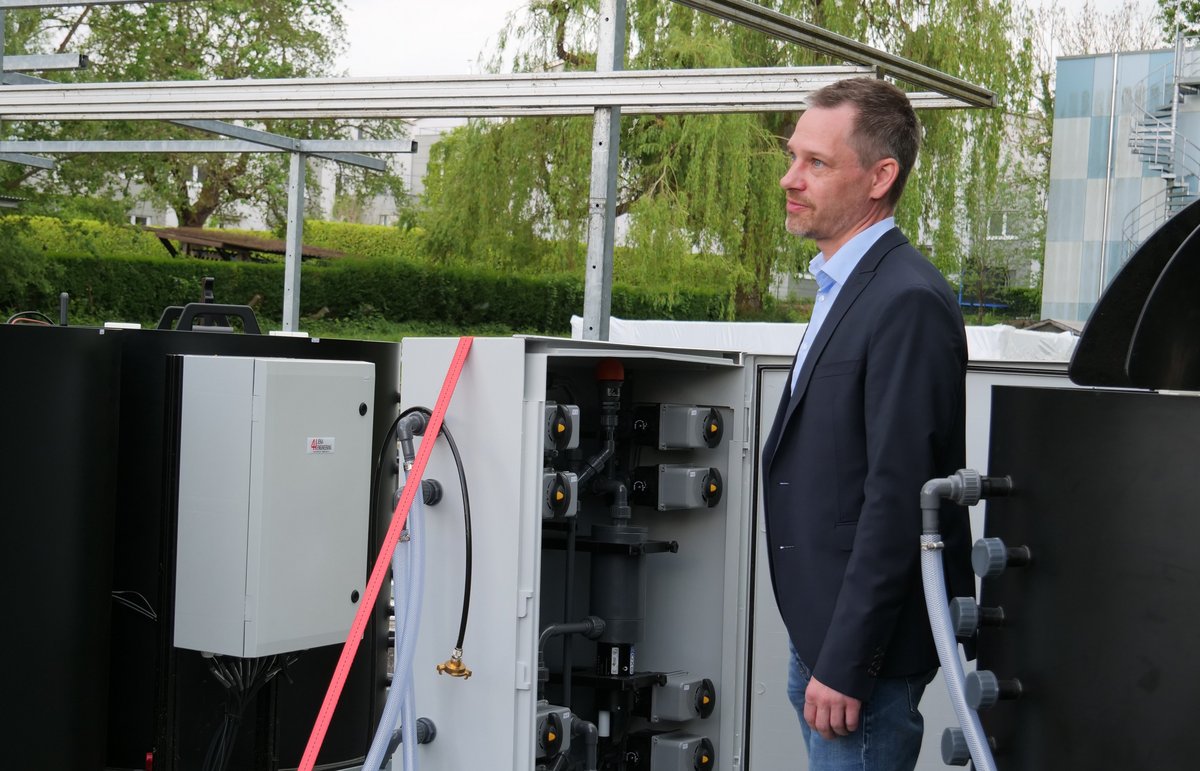
Funding from the Gips Schüle Foundation
The Gips-Schüle-Foundation was established in 1965 by the descendants of the Schüle family, who had successfully mined gypsum in the region of Stuttgart for over 100 years. Today, the assets generated in this way enable the foundation to support a wide range of projects in the fields of science and research, young talent and teaching.
I am very proud of what we have achieved together, and I am very happy that I, as an alumnus, can give something back to my university through the foundation.

Gips Schüle Research group "Communication and Collective Movement (CoCoMo)"
Biologist Dr Ariana Strandburg-Peshkin was the first junior research group leader at the University of Konstanz to receive funding from the Gips-Schüle Foundation. With funding amounting to 875,000 euros, the Gips-Schüle-research group Communication and Collective Movement (CoCoMo) was established in 2018. Since then, the University of Konstanz has been pursuing the goal of expanding research in the field of "Collective Behaviour" and developing Konstanz into a centre for cutting-edge research.
Strandburg-Peshkin and her team study how social groups communicate and coordinate with one another across a range of different species and contexts. The interdisciplinary research project is working on acoustic communication, social behaviour and collective movement decisions in animal groups, among other things. The international team is made up of scientists from a wide range of disciplines.
In order to achieve the best possible research results, the team is comprised of animal behaviour researchers as well as colleagues from the disciplines of physics, engineering, psychology and machine learning. The project is scheduled to continue until 2028.

ABOVE - Aquatic Biodiversity Exploratories
The Limnological Institute at the University of Konstanz is building a new type of experimental facility called "ABOVE – Aquatic Biodiversity Exploratories". Once the facility is running, it will be possible to identify and observe changes in biodiversity using the example of plankton communities under different conditions over long periods of time and to follow their development under various simulated environmental influences.
Since April 2024, the first four mesocosm systems (water tanks with a capacity of approx. 500 litres) have been in place. A total of 16 water tanks will enable automated image capture for the analysis of the biotic communities. The associated research project, led by Professor Lutz Becks, uses artificial intelligence to answer questions about whether and under what conditions new biodiversity can develop after a biodiversity loss.
![[Translate to Englisch:] Dr. Manuel Häußler im Labor [Translate to Englisch:] Dr. Manuel Häußler arbeitet im Labor](/fileadmin/_processed_/3/2/csm_ManuelHaeussler_9107b5d902.jpg)
Nachwuchspreis (award for yount talent) for Dr. Manuel Häußler
Chemist Dr Manuel Häußler has developed future-oriented plastic alternatives at the University of Konstanz that can be decomposed into their individual components without leaving any residue after use. This approach turns the current restrictions on the recycling of plastics into a thing of the past. Polyethylene was developed in the 1950s and is still by far the most commonly used plastic in the world today. Due to the rapidly increasing quantities of problematic plastic waste, there is an urgent need for alternative materials that are fully recyclable and environmentally friendly while providing the usual practical advantages of polyethylene.
As a doctoral researcher, Häußler developed a plastic with this sophisticated portfolio of properties. In chemical recycling, the colourants and foreign substances in plastic waste are also separated out. This way, full-circle plastic recycling is possible. "This means that even heavily coloured plastics containing additives can be recycled and processed into new, colourless plastic," says Häußler. For his innovative doctoral thesis, which he used to establish a start-up (aevoloop GmbH), Manuel Häußler received the Gips-Schüle "Nachwuchspreis" (award for young talent) in the technical sciences category, endowed with 10,000 euros.
![[Translate to Englisch:] Deutschlandstipendium](/fileadmin/_processed_/9/8/csm_Gips-Schuele-DStip_5fc6d14f85.jpg)
Konstanz Scholarship Fund
Since 2019, the Gips Schüle Foundation has been the sponsor of the Konstanz Scholarship Fund scholarship at the University of Konstanz. The scholarship supports talented students with outstanding academic achievements. The selection committee also takes into account voluntary work and the overcoming of educational hurdles. The scholarship thus makes a valuable contribution to greater equality in education and to the future viability of our business and science location. Thanks to the Gips Schüle Foundation's annual commitment, ten students can be supported with a scholarship each year.
